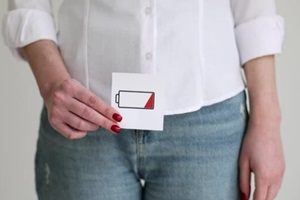 IUDs, or intrauterine devices, are a widespread type of birth control that sit inside the uterus to prevent pregnancy. However, some people have questions about potential IUD side effects such as lowered sex drive or pain during sex.
IUDs, or intrauterine devices, are a widespread type of birth control that sit inside the uterus to prevent pregnancy. However, some people have questions about potential IUD side effects such as lowered sex drive or pain during sex.
This article explores the research on IUDs and sexual health so you can weigh the pros and cons before getting one.
How IUDs Influence Libido
An IUD may or may not alter sexual desire—it depends on the individual. Influences vary based on IUD type and personal factors such as hormones and stress.
Hormonal IUDs release progestin, a synthetic hormone, directly inside the uterus. For some women, progestin reduces testosterone circulating throughout the body. Since testosterone is essential in regulating libido, this dip can dampen desire.
However, studies on the subject remain mixed. Over half of hormonal IUD users generally notice no significant change in their sex drive. Meanwhile, 1 in 5 report an increased libido after insertion, while 1 in 10 share decreased desire. Those using lower-dose IUDs seem more prone to drops in desire than those using higher-dose versions.
Copper IUDs have no direct hormonal impact themselves. However, they can provoke heavier menstrual bleeding and more severe cramping, which indirectly lowers the sex drive for some users. Discussing heavy menstrual flow and debilitating cramps with your doctor can uncover ways to manage difficult side effects and restore your libido.
Influence on Arousal, Orgasm, and Pleasure
In addition to libido effects, IUDs may also alter genital arousal, orgasm quality, and overall sexual pleasure. Research links hormonal IUDs for some women to increased vaginal dryness and pain during sex.
However, other users report increased genital sensitivity, quicker arousal, and more pleasurable orgasms after insertion. This benefit may stem from decreased anxiety about the risk of unwanted pregnancy.
Again, responses depend greatly on the individual. Positively, those reporting pain during intercourse might benefit from adding lubricant or switching to non-hormonal birth control.
For those with lackluster orgasms, it becomes a matter of exploring new stimulation techniques rather than assuming low sexual response as something you must passively accept.
Copper IUDs infrequently directly influence physical arousal or orgasm intensity. However, heavier periods or worse menstrual cramps can inhibit pleasure during intercourse if they make sex uncomfortable. Consulting your gynecologist about pain relief options can help resolve these issues and restore your satisfaction between the sheets.
Impact on Sexual and Emotional Intimacy
 When your libido or arousal changes unexpectedly, emotional intimacy with your partner often suffers, too. But don’t panic—you have options.
When your libido or arousal changes unexpectedly, emotional intimacy with your partner often suffers, too. But don’t panic—you have options.
Try to keep communicating openly if your IUD triggers symptoms that put intercourse on pause. Explore alternatives such as sensual massage, mutual masturbation using hands or sex toys, or oral stimulation. Prioritize emotional bonding through affectionate conversations and activities.
Create opportunities for physical closeness through cuddling, kissing, and stroking one another. Depending on the severity, there are ways to manage troublesome physical symptoms directly.
For mild concerns such as erratic bleeding, apply heating pads, avoid intercourse on heavy-flow days, or use extra lubricant to make sex more comfortable. More bothersome issues may require clinical care—your gynecologist can offer medication to control bleeding intensity or switch birth control methods if suitable.
When to Reach Out for Help
If an IUD provokes sexual symptoms causing emotional distress or physical pain, promptly consult your healthcare provider. Describe all your symptoms thoroughly so they can determine whether the issues likely stem from the IUD itself.
Depending on your symptoms, they may suggest techniques to find relief or offer alternative contraception better aligned with your needs.
Carefully Weighing Pros and Cons
In the end, IUDs affect sexuality to varying degrees based on the individual. You may experience few effects, find the side effects manageable, or consider them unacceptable.
Evaluate your IUD’s impact after six months once your body adapts to the device. Maybe you appreciate reliable pregnancy prevention and perhaps lighter, less painful periods, so you consider negative tradeoffs worthwhile or addressable.
But troublesome symptoms dampening your sex life month after month understandably breed resentment. Openly communicating with your doctor gives you the best chance to enjoy this method while minimizing difficulties through creative coping strategies or alternatives.
Additionally, loop your sexual partner into these conversations if applicable. Getting input about your experiences from multiple sources helps identify the best path forward.
Transitioning to New Birth Control
If attempting to manage IUD side effects proves too challenging, switching methods is entirely valid. First, pinpoint what exactly you hope will change through different contraception.
Do you want reliably higher libido, greater genital sensitivity restored, or less painful periods, for example? Outline your goals beforehand so you can select replacement birth control strategically.
Discuss all available options thoroughly with your clinician. Ask how they may specifically improve the symptoms most disruptive to your sex life and relationship happiness.
Review factors such as effectiveness rates, ease of use, and potential side effects, including sexual effects, before deciding.
Get Personalized Guidance on Your IUD and Libido from Raleigh Gynecology & Wellness
Ultimately, IUDs affect intimacy and libido differently for each person. If you’re considering an IUD, weigh the potential benefits, such as reliable pregnancy prevention against possible side effects such as pain or low arousal.
Track your symptoms over several months since adjustment takes time. If problems persist, explore solutions with your gynecologist, such as trying lubricants, medications, or switching methods. Prioritize open conversations with your doctor and partner about optimizing your birth control, sex life, and relationship happiness.
Raleigh Gynecology & Wellness offers personalized guidance to help you make informed, empowered choices regarding IUDs that align with your needs. Contact us today at (919) 636-6670 or book an appointment online.
